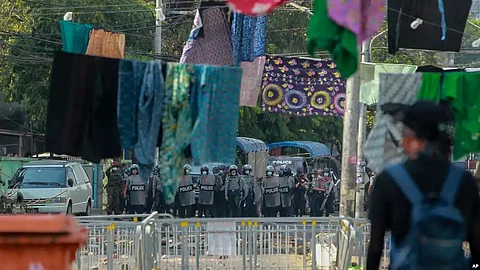The office of the U.N. High Commissioner for Refugees said last year in its Global Appeal 2023 report, violence against civilians and the intensified armed conflict following the coup has caused tens of thousands of refugees to flee into neighboring countries and has displaced more than 982,000 people within Myanmar. The report estimates there are 1.35 million internally displaced people (IDP) in the country, mainly women and children.
“Women have been fearlessly resisting the tyrannical rule of the junta since the beginning of the coup over two years ago. Women are courageous, smart, and in leading roles in the revolution, that’s why the junta is targeting us,” May Sabe Phyu said in an interview at VOA’s Washington headquarters.
“Women are our future leaders,” she said. “In Myanmar, as in the rest of the world, women often have to use innovative ways to get noticed. We have been innovative in our resistance to the military’s oppression, and now we cannot be denied as a force to be reckoned with, that’s why we are being targeted more and more, specifically with sexual violence.”
Miemie Winn Byrd, a Burmese American academic and former U.S. Army lieutenant colonel, struck a similar note.
“There are more women involved in the resistance movement,” she told VOA by Zoom March 29. “You can see more women being arrested and killed, because they're on the front lines, they're a part of the conflict,” she said.
“Most of the victims tend to be women,” she said, “it’s just the anatomy of conflict. Women generally suffer more in conflict than men, and they suffer more when they are arrested because the military uses sexual assault to interrogate, punish and abuse the women in captivity."
In its March 8 statement, the NUG said it would “continue to fight for justice for women whose rights have been violated.”
“Myanmar military is no longer acting like a professional military organization,” Byrd said. “It has become like an organized crime syndicate, using tactics that are not normal for militaries. They are breaking every human rights law.”
Female political prisoners unprotected
According to accounts from VOA sources and news reports, attacks against female prisoners by male prison guards working at Obo prison, in Mandalay, Myanmar’s second largest city, underline the challenges faced by women in Myanmar. The guards reportedly beat the women in captivity, leaving the mostly political prisoners with severe injuries, including head wounds, bruised faces and broken bones.
May Sabe Phyu said the recent reports of attacks inside Obo prison have caused concern among prisoners’ family members, who say they also fear retribution by the junta. May Sabe Phyu said using men to guard female prisoners is against Myanmar’s prison code, something many other activists and human rights watchers say.
According to the Myanmar prison rule book published in 1992, male guards are not allowed to enter dormitories housing female inmates without the presence of female guards. VOA contacted prison authorities by phone about the assault allegations but have yet to receive a response.


